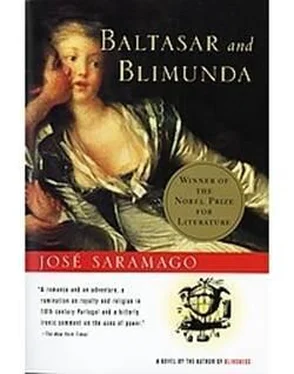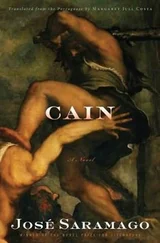José Saramago - Baltasar and Blimunda
Здесь есть возможность читать онлайн «José Saramago - Baltasar and Blimunda» весь текст электронной книги совершенно бесплатно (целиком полную версию без сокращений). В некоторых случаях можно слушать аудио, скачать через торрент в формате fb2 и присутствует краткое содержание. Жанр: Современная проза, на английском языке. Описание произведения, (предисловие) а так же отзывы посетителей доступны на портале библиотеки ЛибКат.
- Название:Baltasar and Blimunda
- Автор:
- Жанр:
- Год:неизвестен
- ISBN:нет данных
- Рейтинг книги:5 / 5. Голосов: 1
-
Избранное:Добавить в избранное
- Отзывы:
-
Ваша оценка:
- 100
- 1
- 2
- 3
- 4
- 5
Baltasar and Blimunda: краткое содержание, описание и аннотация
Предлагаем к чтению аннотацию, описание, краткое содержание или предисловие (зависит от того, что написал сам автор книги «Baltasar and Blimunda»). Если вы не нашли необходимую информацию о книге — напишите в комментариях, мы постараемся отыскать её.
Baltasar and Blimunda — читать онлайн бесплатно полную книгу (весь текст) целиком
Ниже представлен текст книги, разбитый по страницам. Система сохранения места последней прочитанной страницы, позволяет с удобством читать онлайн бесплатно книгу «Baltasar and Blimunda», без необходимости каждый раз заново искать на чём Вы остановились. Поставьте закладку, и сможете в любой момент перейти на страницу, на которой закончили чтение.
Интервал:
Закладка:
Ever cautious, João Elvas left Lisbon and made for Aldegalega at the beginning of January in the year seventeen hundred and twenty-nine, and there he lingered, watching coaches and horses disembark that would be used for the journey. Anxious to know what was happening, he began to make inquiries, What is that, where did it come from, who made it, who will use it, these may sound like foolish indiscretions, but, confronted by this venerable old man, however unwashed and dishevelled, any stable hand felt obliged to offer some reply, which encouraged João Elvas to pluck up enough courage to start questioning the head steward himself, he only needs to put on that pious air to achieve what he wants, for if he knows little about prayers, he knows more than enough about the art of deception. And even when his questions are answered with some rebuff, abuse, or cuff on the ear, that in itself allows him to guess what information has been withheld, for one day, the errors on which history is based will finally be clarified. And so, when Dom João V crossed the river on the eighth of January to embark on his great journey, there awaited him in Aldegalega more than two hundred carriages, including coaches, barouches, chaises, wagons, trailers, and litters, some had been brought from Paris, others had been specially made in Lisbon for the journey, not to mention the royal coaches, with their fresh gilding and refurbished velvet upholstery, their tassels and hand-painted drapes. The household cavalry boasted almost two thousand horses, without counting those of the mounted soldiers who accompanied the royal progress. Aldegalega, because of its strategic location for traffic en route to Alentejo, has seen many expeditions in its time, but never on such a scale, one need only consider the small roster of domestic staff, two hundred and twenty-two cooks, two hundred halberdiers, seventy porters, one hundred and three valets to look after the silver, over a thousand men to attend to the horses, and innumerable other servants and dusky slaves in every shade and hue. Aldegalega is aswarm with people, and the crowds would be even greater if the nobles and other dignitaries had not travelled on ahead in the direction of Elvas and the river Caia, nor was there any other solution, for if they had all set out at the same time, the royal princes would have married before the last of the invited guests entered Vendas Novas.
The King sailed past in his brigantine, having first worshipped at the shrine of Our Lady, Mother of God, and he disembarked accompanied by Prince Dom José and the Infante Dom António and their respective attendants, namely, the Duke of Cadaval, the Marquis of Marialva, and the Marquis of Alegrete, who acted as equerry to the Infante along with other members of the nobility, that they should have fulfilled such a role need cause no surprise, for it is ever an honour to serve the Royal Family. João Elvas was among the crowd that broke ranks and shouted, Long live the King, as Dom João V, sovereign of all Portugal, went past, and if that was not what they were shouting, it sounded very much like it, for one can always tell the difference between acclaim and derision, besides, who would dare to voice resentment in public by shouting insults, it is unthinkable that anyone should show lack of respect for the King, even if he does happen to be the King of Portugal. Dom João V took up residence in the apartments of the Clerk of Council, João Elvas suffered his first disappointment when he discovered there was a horde of beggars and tramps accompanying the procession, on the lookout for scraps of food and alms. Wherever they found something to eat, he would find something, too, but whatever their reasons for making the journey, his were the most worthy of all.
It was about five-thirty and still dark when the King set out for Vendas Novas, but João Elvas had left before him, because he was determined to see the procession pass in full array, in preference to seeing the chaotic preparations for departure while the various carriages took up their positions as dictated by the master of ceremonies amid the cries of outriders and coachmen, who are notorious for their loud behaviour. João Elvas was unaware that the King still had to attend Holy Mass at the Church of Our Lady of Atalaia, so when dawn broke and there was still no sign of the procession, he slackened his pace and finally came to a halt, where the devil could they be, he thought to himself as he sat by a ditch, sheltered from the morning breeze by a row of aloes. The sky was overcast with clouds that promised rain, and the cold was biting. João Elvas drew his cloak tightly around his body, pulled the brim of his hat down over his ears, and settled down to wait. He waited for an hour, perhaps even more, he saw scarcely anyone go past, and there was nothing to suggest that this was a feast day.
But the feast is on its way. In the distance a fanfare of trumpets and banging of kettledrums can already be heard, those military sounds cause the blood to course through the old man's veins, forgotten emotions are suddenly revived, it is just like watching a woman go by when there is nothing left except the memory of desire, trifling details like a sudden peal of laughter, the swaying of her skirt, or a fetching way of arranging her hair are enough to melt a fellow's heart, take me, do with me what you will, just as if one were being summoned to battle. And behold the triumphal march as it passes. João Elvas sees nothing but horses, people, and coaches, he has no idea who is participating and who is simply looking on, but it costs us nothing to imagine that some kind nobleman sat down beside him, one of those charitable souls whom one sometimes encounters, and since this nobleman is knowledgeable about royalty and court protocol, we listen attentively to what he has to say, Look, João Elvas, behind the lieutenant and the trumpeters and drummers who have just passed by, as you know from your time as a soldier, comes the quartermaster general in charge of billeting the soldiers accompanied by his subalterns, those six horsemen are the royal couriers who carry the dispatches and orders, in the berlin carriage now passing sit the confessors of the King, the Prince, and the Infante, you cannot imagine the burden of sin being transported in that carriage, the penances weigh infinitely less, then comes the carriage with the grooms in charge of the royal wardrobes, why look so startled, His Majesty is not a pauper like yourself, whose only clothes are the ones you're wearing, how curious to possess nothing other than the clothes on your back, and don't be alarmed at the sight of those two carriages packed with clergymen and priests from the Society of Jesus, not always fish or fowl, at some times the Society of jesus, at others the Society of João, both of whom are kings, but these companions are always agreeable, and while we're on the subject, here comes the carriage of the assistant steward, and the three carriages behind are those of the judicial magistrate and the nobles assigned to the royal household, then comes the coach of the chief steward, then the carriages of the footmen who serve the Infantes, and now watch carefully, for this is where the procession becomes exciting, those empty coaches and carriages now going past are the ceremonial coaches and carriages of the Royal Family, and immediately behind follows the deputy steward on horseback, the great moment has arrived at last, get down on your knees, João Elvas, for His Majesty the King along with the Prince Dom José and the Infante Dom António are passing, did you ever see such splendour, such dignity, such a noble and imperious monarch, this is how God Himself will appear when we reach heaven, João Elvas, and however long you may live, you will never forget this moment of perfect bliss, when you saw Dom João V go past in the royal coach while you knelt respectfully at the foot of those aloes, be sure to cherish these images in your mind, for you have been truly privileged, and now you may get up, since the royal party has passed and is well on its way, six grooms have also ridden past, then came four carriages carrying members of His Majesty's council, then the chaise carrying the royal surgeon, for if there are so many in the party who take care of the King's soul, it's only fitting that someone should look after his body, from this point on, there is little of interest, six carriages in reserve, seven unmounted horses led by their reins, the cavalry guard led by their captain, and another twenty-five carriages reserved for the King's barber, valets, footmen, architects, chaplains, physicians, apothecaries, secretaries, porters, tailors, laundry-maids, head cook and his assistant, and so on and so forth, two wagons containing the wardrobes of the King and the Prince, and, closing the procession, twenty-six horses in reserve, have you ever seen such an entourage, João Elvas, now join that horde of beggars and tramps trailing behind, for that is where you belong, and don't bother to thank me for having taken the trouble to explain everything to you, for we are all children of the same God.
Читать дальшеИнтервал:
Закладка:
Похожие книги на «Baltasar and Blimunda»
Представляем Вашему вниманию похожие книги на «Baltasar and Blimunda» списком для выбора. Мы отобрали схожую по названию и смыслу литературу в надежде предоставить читателям больше вариантов отыскать новые, интересные, ещё непрочитанные произведения.
Обсуждение, отзывы о книге «Baltasar and Blimunda» и просто собственные мнения читателей. Оставьте ваши комментарии, напишите, что Вы думаете о произведении, его смысле или главных героях. Укажите что конкретно понравилось, а что нет, и почему Вы так считаете.












